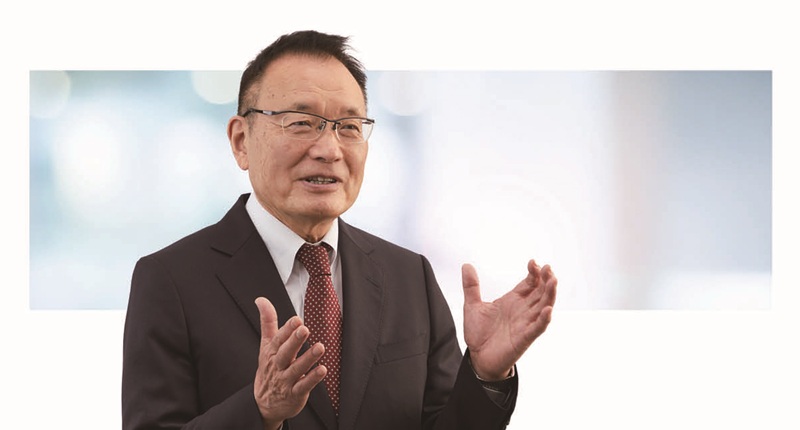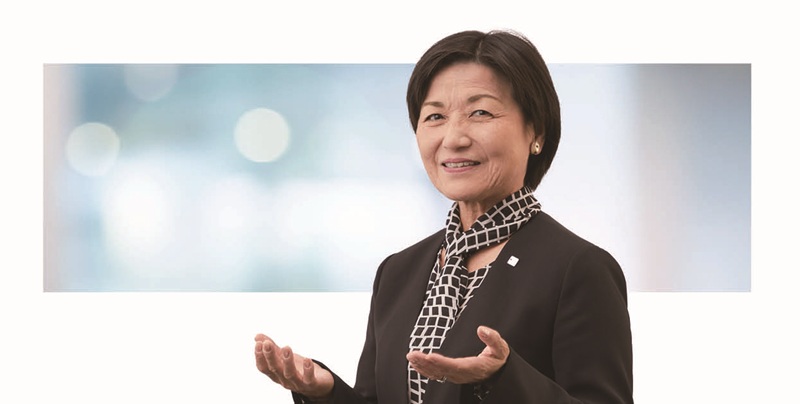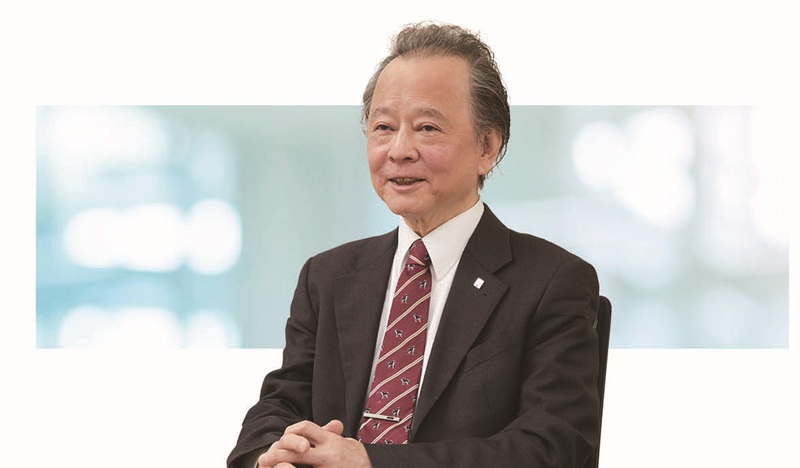Outside Directors & Board Members Roundtable: “What characterizes the effectiveness of the Board of Directors for achieving Otsuka’s medium- to long-term vision?”
How can the effectiveness of the Board of Directors be enhanced in order to ensure Otsuka’s sustainable growth as a total healthcare company?
Two directors who have extensive corporate experience engaged in a discussion on several topics.

View all
Expectations for the Board of Directors within the New Management Structure
Outside Director Aoki I believe that the most important thing in board meetings is to ensure that each director, regardless of whether they are internal or external to the company, actively expresses their opinions and engages in sufficient discussion before reaching a final conclusion, thereby ensuring true effectiveness. I believe that CEO Inoue is skilled at creating an atmosphere conducive to expressing opinions, and is the type of person who listens to discussions before making decisions. As has been the case up to now, the Board of Directors has made decisions without limiting itself to formal deliberations, and I believe that CEO Inoue’s unique management style will continue to energize the Board of Directors in the future.
Outside Director Mita I have served as an outside director for five years, and since the outset, discussions at board meetings have been lively, with outside directors in particular having ample opportunities to express their opinions from diverse perspectives. The explanations provided in advance were thorough, and the staff have taken the time to prepare materials and provide explanations so that even we outside directors could gain a sufficient understanding. With this support in advance, we are able to gain a deeper understanding of the matters being discussed and ask constructive questions from many perspectives at the board meeting. As a result, even if a matter had been thoroughly discussed within the company, the Board of Directors would sometimes decide that it was premature and put the brakes on the proposal. This is a sign that the Board of Directors is functioning effectively. I believe that it will be important to continue deepening discussions on the group’s overall vision, including its organizational structure, in response to evolving societal and business environments.
Outside Director Aoki With a background at a trading company, I contribute managerial perspectives on M&A and business structure, while Director Mita contributes her expertise as a securities company analyst, and the other outside directors offer diverse perspectives from their specialized fields, such as healthcare and accounting. These diverse perspectives create a healthy tension within the Board of Directors. With regard to diversity among directors, rather than taking a purely formal approach, we are considering how to structure the board of directors of Otsuka Holdings, while first confirming the effectiveness of appointing three foreign directors to Otsuka Pharmaceutical. Otsuka’s strength lies in its practice of deciding a response after carefully assessing whether the response will be effective in practice, rather than simply taking a formal approach. I feel that Otsuka is a company that values substance over form.
Outside Director Mita Otsuka Holdings has identified women’s health as one of the social issues to be addressed in the 4th MTMP, and believes that the female perspective is important in healthcare businesses such as the Nutraceutical Business. In this business environment, in addition to myself, there are other female members of the Board of Directors, including Senior Executive Director and CFO Makino, Senior Executive Director Tojo, Audit & Supervisory Board Member Osawa, and Audit & Supervisory Board Member Tsuji. Many female managers are also active in the group’s subsidiaries, indicating that the promotion of women is progressing significantly. In Japan, as an example of addressing women’s health as a social issue, Otsuka is collaborating with medical specialists and local governments to raise awareness among the general public and hold disease-focused seminars for companies, among other initiatives, to promote support for women’s health issues throughout society. In the U.S., we are promoting EQUELLE, a supplement containing equol, which has established brand value in Japan, and we have acquired Uqora, Inc. and Bonafide Health, LLC. In addition, Otsuka Holdings has set “contributing to women’s health” as a materiality indicator in the 4th MTMP.

Human Capital and Financial Strategies that Accelerate Innovation
Outside Director Mita An Otsuka global human resource development system is being established, and I get the impression that employee exchanges between each group company are progressing. The Corporate Planning Department and Finance & Accounting Department of Otsuka Holdings bring together a diverse range of personnel from multiple subsidiaries in the form of secondments and concurrent positions, providing opportunities to cultivate a perspective that encompasses the entire group. When such assets return to their operating companies, the holding company’s perspective permeates each company, mutual understanding among employees deepens, and I feel that the foundation for collaboration and task force projects is being established. In one particular case, when one operating company began developing pharmaceuticals, it collaborated with another operating company that had development expertise, forming a cross-divisional project team. These initiatives not only enhance the mobility of human resources, but also promote the business innovation. I feel that strategically utilizing human capital leads to greater innovation and enhanced corporate value.
Outside Director Aoki Otsuka employees practice the company’s founding spirit of “What only Otsuka can do,” and continuing to practice this spirit is a major strength. POCARI SWEAT and Calorie Mate faced numerous hurdles in gaining understanding of their product value at the outset, but it was because Otsuka stuck to its philosophy and nurtured them persistently that they have been so well received by the market. The efforts over time to demonstrate the company’s reason for existing can be attributed to its strong sense of purpose and solid financial foundation.
Outside Director Mita In recent years, I feel that Otsuka’s financial strategy has undergone noticeable changes. Among these, the introduction and spread of ROIC management has been particularly notable, with management decisions based on ROIC principles being made not only at the holding company level but also at the subsidiary level. Currently, profit and loss management is advancing at the product and business unit levels, enabling companies to gain a deeper understanding of their own revenue structures and strategically review their resource allocation. In addition, the group has a solid financial foundation, and by utilizing a cash management system (CMS), subsidiaries can efficiently share funds within the group, enabling quick investment decisions. These changes will not only strengthen investment in growth areas, but also promote the selection of businesses that need to be reviewed, leading to the growth of the entire group.

Medium- to Long-Term Vision as a Total Healthcare Company
Outside Director Aoki In order for Otsuka to achieve sustainable growth as a total healthcare company, I believe it is essential to formulate a long-term management strategy and establish a system that can respond nimbly to changes in the business environment in the future. My view is that the 4th MTMP is at the preparatory stage for building on our achievements to date and moving on to the next step. The business environment is becoming increasingly complex, and there are more and more situations that cannot be handled by individual efforts alone. In order for the Otsuka group to expand further, it is necessary for the entire group to discuss the vision of the company. I feel that such preparations are steadily progressing behind the scenes.
Outside Director Mita Although the 4th MTMP covers only a limited period of five years, it is positioned as an important period in the long, and continuing, history of the company. In formulating the plan, discussions were held with a view to the 5th MTMP and beyond, and I believe that now is the time to lay the groundwork for that future. I expect that development products in Phase 2 or earlier will flourish during and after the 5th MTMP. Fortunately, both business performance and financial foundations are in good shape, and in FY2024, Otsuka made proactive investments with an eye toward the future, including the acquisition of Jnana Therapeutics Inc., Otsuka Pharmaceutical Factory, Inc.’s expansion into the U.S. market, and the U.S. launch of POCARI SWEAT, which we have been working on since FY2023. It may take some time for the results to become visible, but I would like to contribute to constructive discussions by determining the direction the group should take from a medium- to long-term perspective.
Outside Directors Roundtable: Discussions at the Nomination and Compensation Committee and Expectations for the New CEO
Following the appointment of Mr. Inoue as the new CEO in January 2025, the two members of the Nomination and Compensation Committee discussed the selection process and the role of the Board of Directors in enhancing Otsuka’s corporate value.

View all
The Selection Process of a Successor
Outside Director Matsutani Otsuka Holdings established a Nomination and Compensation Committee as a subcommittee of the Corporate Governance Committee effective April 2023. The Nomination and Compensation Committee is an organization tasked with conducting more detailed discussions on matters such as succession plans for the president and other executive officers, which were previously reviewed by the Corporate Governance Committee. It is composed of the director in charge of administration and all outside directors. The establishment of the Nomination and Compensation Committee marks an important step toward achieving more autonomous and transparent corporate governance.
In the process of identifying specific candidates for the new CEO, I conducted multiple interviews with over ten candidates, including individuals with diverse backgrounds in research, sales, planning, and finance, as well as those hired mid-career. This experience reaffirmed the diversity of talent within Otsuka.
Outside Director Kitachi According to the report “Corporate Governance and Growth Strategies,” published in 2017 as part of the Corporate Governance Project of the Research Institute of Economy, Trade and Industry (RIETI), it is also pointed out that strengthening the supervisory function through the appointment of three or more independent outside directors and engaging in dialogue with institutional investors who place a strong emphasis on governance can enhance corporate discipline. Our Nomination and Compensation Committee includes five outside directors, making it a meaningful initiative in terms of the effectiveness of governance.
The Otsuka group is an organization composed of individuals nurtured in the field, where a culture that values “our-ism” (we) over “me-ism” (I) is deeply rooted. CEO Inoue, with his experience across multiple businesses including pharmaceuticals, has a deep understanding of the fields and embodies “our-ism,” making him a leader whom I sincerely believe is well-suited for the role.

Expectations for Leadership with an Eye on the Future and the Evolution of Governance
Outside Director Matsutani As CEO, Mr. Inoue has the decision-making ability required for the position, the ability to manage all value chains in the Pharmaceutical Business and Nutraceutical Business by leveraging his extensive experience, and the interpersonal skills to build networks both inside and outside the company. He also has a strong desire to continue learning about the increasingly important global perspective, and we expect him to grow further as a leader.
Outside Director Kitachi I believe that the ability to respond swiftly to changes in the capital market is an essential quality for a CEO, and I expect CEO Inoue to further enhance his sensitivity in accurately grasping the financial situation and investor needs and reflecting them in management decisions.
As a platform company spanning pharmaceuticals, healthcare that maintains and enhances people’s health, and the foundations of material science, the Otsuka group faces various challenges requiring competition and innovation. I believe that artistic skills and judgment play a significant role in such management. While the term “STEAM” is sometimes used instead of “STEM,” for a company like Otsuka, which deals with human health and life, the element of “Arts” is as important as rationality. In this regard, I am confident that CEO Inoue, with his flexible sensibility and experience in making decisive judgments, will lead the group to further development as CEO.
* STEAM: Science, Technology, Engineering, and Mathematics, and Arts
Outside Director Matsutani As a doctor, I feel that “arts and science” are highly valued in the clinical setting. The insights and intuition gained through engaging with patients are important strengths. Despite his calm demeanor, CEO Inoue is a person who is prepared to make tough decisions when necessary and has the courage to do so. In fact, his behavior and management style in board meetings demonstrate his sense of balance and strength of will.
Outside Director Kitachi Under the leadership of such individuals, the Board of Directors and the Nomination and Compensation Committee will also be required to operate at a higher level. With the addition of Mr. Jiro Seguchi, a former investment banker, to the Board of Directors as an outside director, the Board has gained new energy and a sense of tension. All members of the Board are committed to further enhancing corporate governance with a strong sense of mission.
Remuneration Systems that Support Sustainability Management
Outside Director Matsutani We view the changes to our compensation system as part of our ongoing efforts to enhance Otsuka’s corporate value. We have gradually shifted from a system centered on fixed compensation to variable compensation that emphasizes mid- to long-term performance. In recent years, we have also introduced non-financial indicators in response to societal demands. For example, we have incorporated FTSE scores, which are external evaluation indicators related to ESG, into our stock compensation system to establish objective evaluation criteria. Making transparent decisions is important for clearly communicating Otsuka’s stance to both internal and external stakeholders, and we are steadily advancing reforms to our compensation system.
Outside Director Kitachi The incorporation of ESG scores symbolizes a qualitative evolution in the compensation system itself. It is precisely because we are committed to sustainability management that we were able to introduce ESG scores into our compensation system. Even if achieving certain ESG targets proves challenging, we will never consider relaxing our standards. Under its sustainability management framework, the Otsuka group is committed to delivering sustainable value to all stakeholders, including society, customers, employees, shareholders, and business partners. In its compensation system as well, the company will continue to develop mechanisms that support the long-term enhancement of corporate value.


View all
I have worked as an investment banker at the Bank of Tokyo, Ltd. (now MUFG Bank, Ltd.) and Merrill Lynch Japan Securities (now BofA Securities), focusing on corporate support through capital markets and strengthening corporate governance. As I take on the role of outside director at a publicly listed company for the first time, I will leverage the experience I have gained so far to contribute to the mid- to long-term growth of Otsuka Holdings.
My relationship with the Otsuka group has continued since 2009 when I visited the factories in Tokushima while working at Merrill Lynch Japan Securities. Through dialogue with the capital markets and advisory services, I was able to directly experience the Otsuka group’s sincere commitment to total healthcare and its proactive corporate stance. I have also come to deeply appreciate the company’s consistent commitment to contributing to healthcare while pursuing new growth areas.
Later, when I had the opportunity to visit Tokushima again, I learned through conversations with local residents that the Otsuka group is deeply rooted in the community and contributes to it. I believe this is one of the reasons why the company has been able to survive for over 100 years.
I have experienced turbulent times such as the collapse of Japan’s bubble economy in 1990s, financial crises, and the global financial crisis of 2008 while working at the forefront of corporate management. I firmly believe that building long-term relationships based on trust, rather than pursuing short-term results, is essential for corporate growth, even in an ever-changing environment. This belief is also reflected in Otsuka group’s commitment to addressing social issues such as health maintenance and promotion, as well as preventive healthcare.
Going forward, as an outside director of Otsuka Holdings, I aim to support transparent governance that meets the expectations of the capital market from an external perspective, while keeping a close eye on improving the profitability and capital efficiency of the Otsuka group. I will engage in constructive discussions at the board of directors to contribute to the sustainable enhancement of corporate value.








